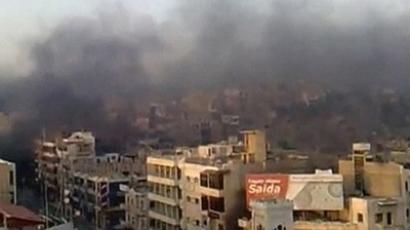No end in sight to Syrian clashes
Reports of heavy casualties during clashes between the Syrian army and opposition supporters have whipped up a wave of disapproval around the globe. While there are small signs that violence may be receding, an end to the clashes seems still remote.
That’s the opinion of political analyst Frank Spring who believes a timetable for ending clashes between the army and the opposition forces in the region is subject to too many variables. “The timetable on this [violence] depends on a number of things. The issue is that the Syrian army is primarily a conscript army and Syria is a largely Sunni country. The soldiers are Sunnis, the officer class are all “the whites” – the group from which the ruling family, including the Assads, are derived.The small minority of other “whites” are the officers and very much the rulers of the government, and then there is the conscripted army of Sunni soldiers,” Spring explained.“And the question really is how much longer can all the “white” officers give orders to Sunni conscripts to fire on their own people before we start seeing soldiers refusing to fire,” he continued. “There are some reports that it’s already occurring at a fairly low level.” The situation is aggravated by the economic difficulties the country is facing.“The other concern is that the Syrian state is no longer able to maintain its traditional subsidy-driven socialist model by which Syrian families have enormous subsidies on, for example, energy costs. One of the reasons this has kicked off is they are no able longer to provide it, and people are unhappy. That’s the same worrying combination of military control and real economic hardship,” explains the expert. President Bashar Assad has recently admitted that the country must embrace reform, but Frank Spring says the Syrian leadership is not serious about the change.“I think we’ve seen how serious they are about that change. When Assad came in 2000 he was seen as a reformer of Syria, as someone who could bring a new degree of economic liberalism, a greater degree of political freedom and democracy, and what he has done is he has built on a very sophisticated intelligence state […] and used it to suppress any degree of dissent. And I think we’ve seen just how serious Assad is about bringing change. And the answer is, he is not,” he said.
However, the fact is that if Assad wants to find any solution to the stalemate, he has to make genuine offers of reform, believes former UK ambassador to Syria, Basil Eastwood. “I don’t see any solution in sight at the moment. What one would hope would happen is that President Assad would make more realistic efforts to negotiate and make genuine offers of reform. At the moment, he has talked about reform but not done anything. He has talked about checking the security state, but in fact has unleashed it. Real moves in that direction, however, would have to be made in order to encourage any of the demonstrators to enter into negotiations. At the moment, anybody who said he wanted to negotiate a transition with the government would be disowned by those who are demonstrating,” he said.
Meanwhile, another political scientist, Jonathan Weckerle from Berlin, believes Assad’s regime is doomed.“It’s hard to say how long Assad can stay in power, but we have to see clearly that this latest crackdown is not a sign of strength but a sign of weakness. The regime couldn’t really stop the protests for over four months now, and they in vain try to offer the opposition some kid of fake reforms, but it’s not an option,” he said.














